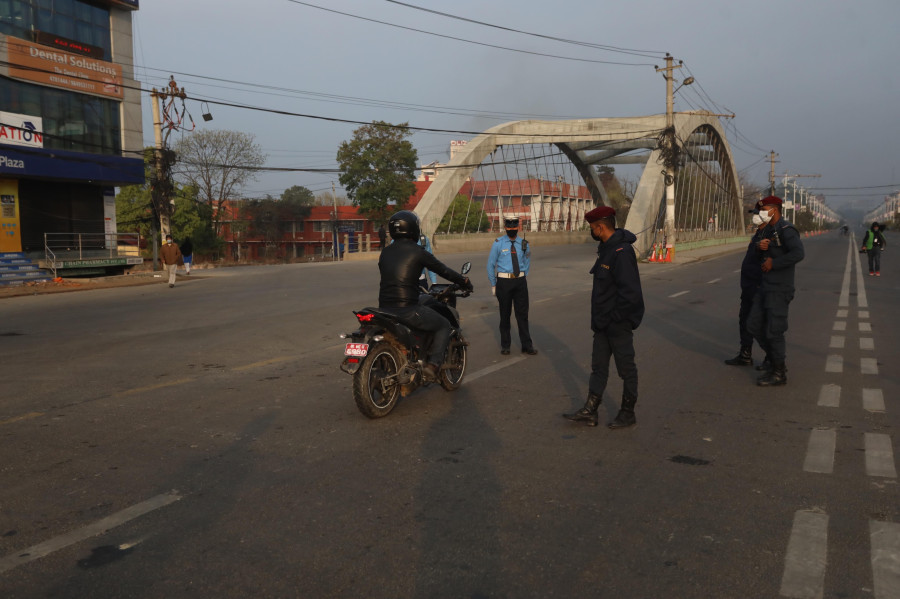National
Thousands of security personnel enforce lockdown across country
The personnel are manning border points, patrolling roads and markets to ensure that people don’t come out on the streets during the lockdown.
Shuvam Dhungana
Thousands of security personnel were deployed across the country on Tuesday to enforce the first day of government-announced week-long lockdown to prevent the spread of Covid-19.
The personnel are manning border points, patrolling roads and markets to ensure that people don’t come out on the streets during the lockdown, which was announced on Monday by the deputy prime minister-led Covid-19 Prevention and Control Coordination Committee.
The meeting had decided not to allow members of the public to come out of their homes, except in case of an emergency until March 31.
“Thousands of Nepal Army, Nepal Police, and Armed Police Force personnel have been deployed across the country for the effective implementation of the decision [lockdown],” said Deputy Inspector General Shailesh Thapa Kshetri, spokesperson for Nepal Police.
The personnel are deployed at entry points, main roads, markets, and they are patrolling different places, said Kshetri. “Officials in civil clothes have also been mobilised to check black marketeering.”
Although the government announced that anyone defying the lockdown order would be charged under the Infectious Disease Control Act, police said they haven’t used the provision yet. Police are sending people who show up on the road back home after talking to them about the risk of a virus outbreak.
“Many people seemed to follow the government order. The number of people on the streets was very low,” said Deputy Superintendent, Hobindra Bogati, spokesperson for Kathmandu Metropolitan Police Range. “Although few people were found violating the order, they too returned home.”
According to the Act, those found defying the lockdown order can be jailed for a month and/or fined Rs 100. “However, we haven’t had to take such action. Everything is normal till now,” he said.
Although major roads and highways across the country wore a deserted look, things were different in the villages.
Ajay Khatri, 24, of Kathmandu, who returned to his village Thanpal Dhap in Sindhupalchok after the government decided to halt public transport, said the population of his village has increased in the past few days. Most people who were in the cities for various purposes returned home, but they are not following government instructions.
“People are busy doing their regular work and there’s no one to inform them about a possible coronavirus outbreak and its consequences,” said Khatri. “We haven’t seen any police official come to this area,” he added.
Similarly, 23 year-old Bharat Thapa, who returned to his home in Dhanusa, said people were not taking the virus threat seriously. “People are gathering and going about their lives like before,” said Thapa. “Many even don’t have an idea about quarantine. Very few policemen have been seen on the streets.”
However, Kshetri said people were complying with the lockdown order. and enough security personnel have been mobilised to keep people home. “Our personnel are conducting awareness programmes by using miking systems to spread information about the virus,” said Kshetri. “We have enough personnel in the field.”
Meanwhile, as a large number of personnel have been mobilised across the country, Nepal Police Headquarter has directed every police station to take safety precautions to prevent the spread of the contagious virus.
According to Kshetri, personnel have been provided face masks and sanitisers. “We have already made them aware of the situation. We have also arranged quarantine and isolation beds for our personnel if anyone gets infected while discharging their duties.”




 18.12°C Kathmandu
18.12°C Kathmandu














